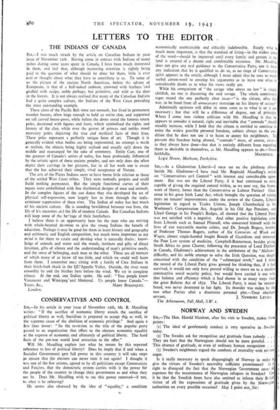Siu,—As a Gladstonian Liberal—I once sat on the platform almost
beside Mr. Gladstone—I have read Mr. Reginald Maudling's article on "Conservatives and Control" with interest and considerable agree- ment. But was not the Liberal Party, if it had continued to exist, capable of giving the required control within, as we now say, the frame- work of liberty, better than the Conservative or Labour Parties? Glad- stone in his great Irish Land Act, which brought the question of raising rents on tenants' improvements under the review of the Courts, Liberal legislation in regard to Trades Unions, Joseph Chamberlain in his Workmen's Compensation Act, Asquith in his Old Age Pensions, and Lloyd George in his People's Budget, all showed that the Liberal Party was not satisfied with a negative. And other positive legislation came from Liberals such as Samuel Plimsoll, who concerned himself with the lives of cur mercantile marine sailors, and Dr. Joseph Rogers, brother of Professor Thomas Rogers, author of Six Centuries of Work and Wages, almost single-handed fought Boards of Guardians and reformed the Poor Law system of medicine. Campbell-Bannerman, besides giving South Africa its great Charter, following the precedent of Lord Durham in Canada, Gladstone's achievement in the settlement of the 'Alabama' difficulty, and his noble attempt to solve the Irish Question, was deeply concerned with the condition of the "submerged tenth,"- and I think the record of the Liberal Party gives ground for thinking that, if it had survived, it would not only have proved willing to move on to a modern constructive social security policy, but would have carried it out with that balance and efficiency which it had shown in so many ways since the great Reform Act of 1832. The Liberal Party, it must be remem- bered, was never destroyed in fair fight. Its thunder was stolen by the two other Parties after a disastrous personal plot.—Your obedient
The Athenaeum, Pall _Mall, S.W. r.


























 Previous page
Previous page